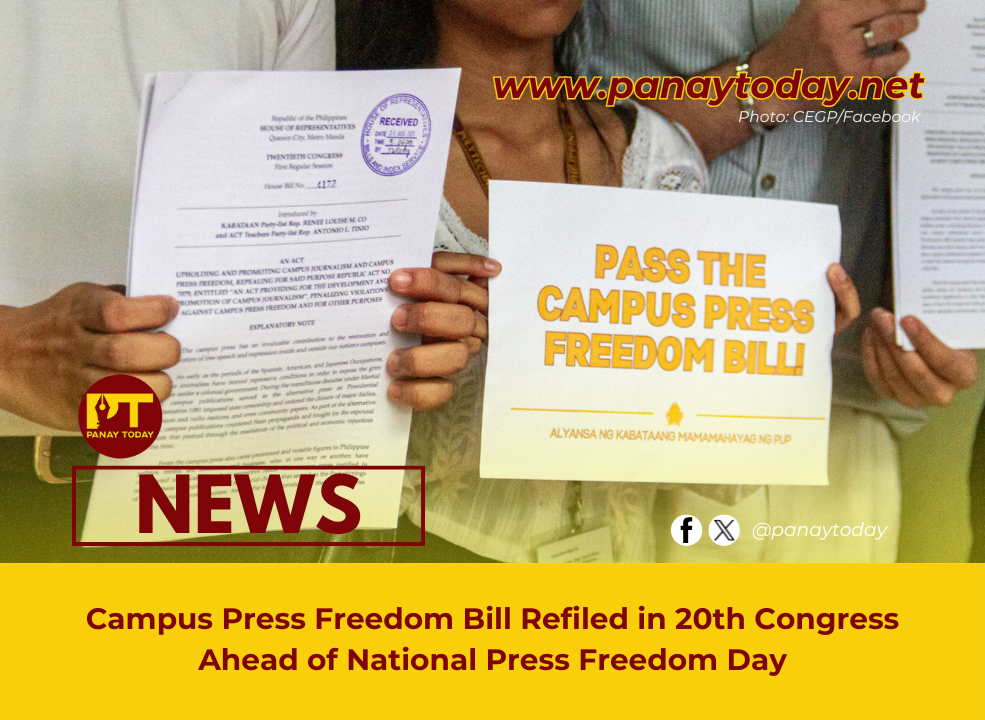The College Editors Guild of the Philippines (CEGP), together with Kabataan Party-list, has officially refiled the Campus Press Freedom (CPF) Bill before the House of Representatives, just two days ahead of National Press Freedom Day on August 30.
The bill, now designated as House Bill 4172, seeks to repeal the Campus Journalism Act of 1991, a law long criticized by media freedom advocates as outdated and inadequate in protecting the rights and independence of student publications. Press freedom groups argue that the existing law has allowed widespread administrative interference, undermining campus press freedom across Philippine universities and colleges.
CEGP, the oldest and broadest alliance of student publications in the Asia-Pacific region, has documented over 1,000 campus press freedom violations (CPFVs) since 2010, with 206 cases recorded in 2024 alone. These violations include censorship, administrative intervention, withholding or looting of publication funds, non-mandatory collection of publication fees, expulsion or suspension, harassment, libel threats, red-tagging, and state surveillance. Censorship—both online and offline—remains the most prevalent form of attack.
In recent years, especially during politically sensitive periods such as the national elections, campus press repression has intensified. Among the reported cases: Today’s Carolinian, the official publication of the University of San Carlos, was forcibly evicted from its office, while administrators continued to withhold its publication funds. In Bicol, TheSPARK of Camarines Sur Polytechnic Colleges reported harassment from a gubernatorial candidate tied to a powerful political dynasty.
“Violations of campus press freedom have long gone unpunished, as they are often deemed inconsequential by school administrators and the government alike,” National Spokesperson Brell Lacerna argued.
“Efforts to impose weak protective measures to address these violations fall short of meeting the genuine demands of the press. Instead, dysfunctional bureaucratic procedures and anti-student policies have become the default responses used to preserve institutional control amidst the ongoing education crisis,” Lacerna added.
The Campus Press Freedom Bill, first introduced in 2011, has now been filed in every Congress since the 15th. It was initially proposed as House Bill 4287 by former Kabataan Rep. Raymond Palatino and former Bayan Muna Rep. Teddy Casiño, a former national president of CEGP. Succeeding versions were filed by former Kabataan Reps. Terry Ridon (HB 1493 in 2013), Sarah Elago (HB 3636 in 2016 and HB 319 in 2019), and most recently in 2022 as HB 1155 by incumbent Kabataan Rep. Raoul Manuel. All versions were referred to the Committee on Higher and Technical Education but failed to gain traction.
The current version, HB 4172, reiterates the need for legislation that will genuinely uphold campus press freedom and protect student journalists from censorship and retaliation, particularly in a political climate where youth dissent is increasingly repressed.
While Section 2 of the Campus Journalism Act of 1991 declares the state’s intent to promote campus journalism as a tool for ethical development and critical thinking, advocates say this commitment has not translated into protection on the ground.
“Student publications across the Philippines affirm that campus press freedom is essential to the broader struggle for accessible and quality education,” CEGP emphasized.
“Beyond awaiting the bill’s progress in Congress, the campus press’s unwavering commitment to truth and justice must propel its campaign into the streets—mobilizing more students and communities to actively defend their rights and welfare, and holding state actors accountable for their attacks on our education,” the group added.
CEGP’s regional chapter in Panay welcomed the re-filing of the bill and expressed gratitude to the broad youth movement that sustained the campaign over the years. “Thank you to Kabataan Party-list, ACT Teachers Party-list (Makabayan Bloc), the College Editors Guild of the Philippines (CEGP), and all its member publications, institutions, and regional chapters—and most importantly, to the brave campus journalists and the broad youth movement who continue to push for and uphold the rights of the youth—within schools, in communities, and even in Congress!” CEGP Panay said in a statement./PT





